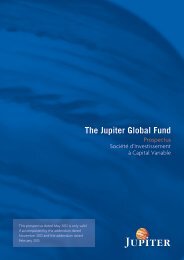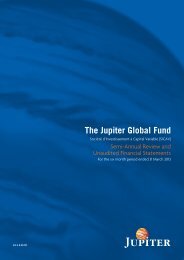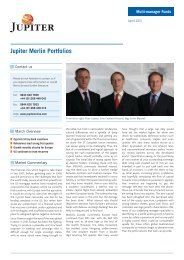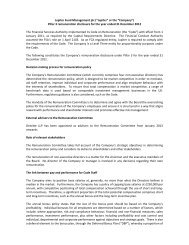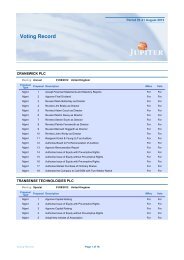The Jupiter Global Fund - Jupiter Asset Management
The Jupiter Global Fund - Jupiter Asset Management
The Jupiter Global Fund - Jupiter Asset Management
Create successful ePaper yourself
Turn your PDF publications into a flip-book with our unique Google optimized e-Paper software.
the jupiter global fund<br />
<strong>Jupiter</strong> Asia Pacific<br />
■■<strong>Jupiter</strong> Asia Pacific Review of Portfolio as at 30 September 2012<br />
Performance<br />
NAV 30.09.12 30.09.11 % Change<br />
Class L US Dollar Shares USD 22.18 USD 19.14 15.88%<br />
Class L Sterling Shares GBP 11.83 GBP 10.59 11.71%<br />
Market Review<br />
Developments in western economies had a large impact on investor<br />
sentiment towards global equity markets throughout the 12 month<br />
review period. <strong>The</strong> eurozone sovereign debt crisis, which dominated<br />
the second half of 2011, dragged on into 2012 as European leaders<br />
struggled to find a resolution. <strong>The</strong> uncertainty surrounding the crisis<br />
and concerns regarding the growth rates of China and the United<br />
States were the main factors creating substantial market volatility.<br />
<strong>The</strong>se fluctuations were accentuated for emerging markets, which<br />
tend to show greater sensitivity to changes in investor confidence. At<br />
the start of 2012, it appeared that the European Central Bank’s (ECB)<br />
measures to improve liquidity in the financial system had sparked a<br />
market rally. Asian markets participated strongly, with those countries<br />
that had underperformed to the greatest extent in the last six months<br />
of 2011 – such as India – benefiting the most in the bounce. But after<br />
two months of positive returns a renewal of concerns over the Chinese<br />
economy, and whether its slowdown would take the form of a ‘hard<br />
landing’, led global markets down. China and India, the two largest<br />
Asian economies, had to contend with stubborn inflation in the latter<br />
half of 2011 and the resultant monetary tightening by their central<br />
banks had an impact on their economic growth trajectories. However,<br />
a pledge by the ECB to do ‘whatever it takes’ to resolve the eurozone<br />
debt crisis precipitated a rally in global markets in the summer and<br />
there was a further boost in the final month of the review period after<br />
the US Federal Reserve launched a third round of quantitative easing<br />
and the ECB committed to a programme called ‘Outright Monetary<br />
Transactions’ via which eurozone sovereign debt would be purchased.<br />
Investment outlook<br />
Fluctuations in Asian stock markets resulting from news flow concerning<br />
western economies are presenting patient long-term investors with<br />
what are, in our view, attractive entry points. In our opinion, government,<br />
corporate and consumer debt profiles in the Asian region are in far<br />
better shape than Europe or the US. However, the Federal Reserve’s<br />
third round of quantitative easing is likely to precipitate a rush of liquidity<br />
into traditionally higher-yielding Asian assets, and this could push<br />
inflation in the area to uncomfortably high levels.<br />
We remain optimistic that although economic growth is tapering, the<br />
Chinese economy will nonetheless avoid a hard landing. We are also<br />
confident that once the transition of political power has taken place by<br />
the end of the year, new measures will be introduced to stimulate<br />
growth and manage the country’s transition from a trade and exportoriented<br />
economy to a consumption-led economy. Following a <strong>Fund</strong><br />
manager visit to the Philippines and Indonesia in the summer, we are<br />
also upbeat regarding the growth prospects for the smaller countries<br />
in the region. We were impressed by the state of government and<br />
corporate finances, as well as the extent to which these economies’<br />
growth is driven by domestic activity rather than export dependency.<br />
Ben Surtees<br />
30 October 2012<br />
Policy review<br />
For the year to 30 September 2012, the <strong>Fund</strong> returned 15.9%, compared<br />
to 19.9% for its benchmark, the MSCI AC Asia ex Japan index. <strong>The</strong><br />
<strong>Fund</strong> has a larger exposure to small and mid-cap companies than the<br />
index and these smaller companies were the worst affected during<br />
periods of equity market weakness, detracting from the <strong>Fund</strong>’s relative<br />
performance. <strong>The</strong> <strong>Fund</strong>’s bias towards mid and small-sized companies<br />
will be maintained as investor antipathy towards this segment of the<br />
market during periods of global uncertainty provides attractive entry<br />
points for investors with longer time horizons. From a geographic<br />
perspective, the <strong>Fund</strong>’s overweight exposure to China was the biggest<br />
drag on relative performance. As investors fretted over the pace of the<br />
slowdown in the Chinese economy, its domestic equities were among<br />
the hardest hit. We believe that fears of a ‘hard landing’ for the economy<br />
are overplayed and that recent policy measures, including monetary<br />
easing, should allow a more managed reduction in the economic growth<br />
rate. <strong>The</strong> Philippines was one of the best performing regional markets;<br />
we have held a small overweight exposure to this country which made<br />
a positive contribution to performance.<br />
38



